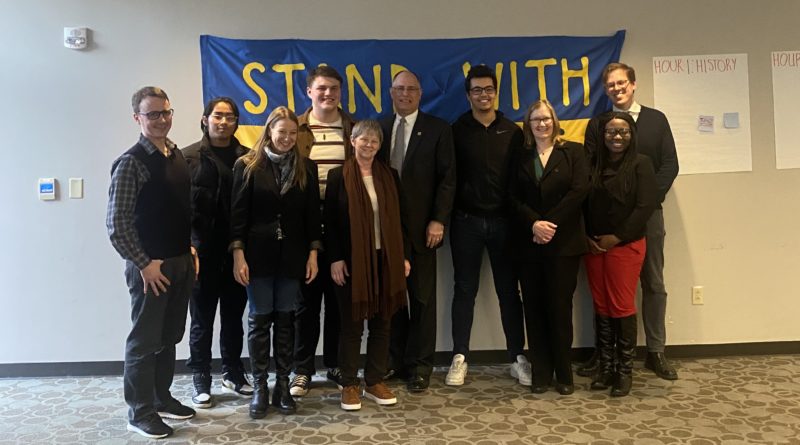Ukrainian teach-in creates conversation around peace
President Eric Spina, faculty and students stand in front of the Ukraine flag at the teach-in. Photo courtesy of Judd.

Lucinda Judd | Business Manager
Benjamin Salmon was a man who answered the call to serve in World War I and dutifully registered for the draft. But when he was called up one fateful Christmas Day, he refused to serve on the grounds of Catholic Conscientious Objection.
Salmon was thrown in prison for his refusal to serve. According to Nicholas Rademacher, a professor in the religious studies department at UD, military service from WWI to today has been viewed as an objective moral good. Rademacher also stressed the idea that just because someone is anti-conflict, does not make them “pro-Putin, pro-totalitarianism, and therefore undemocratic and therefore un-American.”
“Today we find ourselves in a similar situation, embroiled in a military conflict in Ukraine,” Rademacher said. “Even without troops on the ground, we are implicated in its cause and in its continuance.”
Rademacher was one of several professors that presented at a teach-in on the war in Ukraine on Tuesday, March 22. The event was fostered by the Human Rights Center, which is run by a number of professors, graduate assistants and student interns. The executive director position is filled by Shelley Inglis who was one of the organizers of the event along with Ph.D. of philosophy, Paul Morrow. The five-hour event covered five topics: history, politics, law, war and peace.
In the 4 p.m. program on peace, Rademacher, along with two other speakers, discussed the ideas of Catholic Conscientious Objection, the romanticism of war and Gandhian nonviolence.
Rademacher’s overarching thought was that people who are engaged with faith in any aspect, such as attending a Catholic Marianist university, must actively practice nonviolence. He urged the students, faculty and visitors in the audience to not attempt to justify the war between Russia and Ukraine and instead engage in practical steps to oppose it.
Religious studies professor Kelly Johnson also addressed the idea that war and faith are intermingled. When discussing the idea of a just war, it brings out a feeling of sacrificial violence — that someone is fighting something intrinsically bad, according to Johnson.
“There is a spiritual beauty in rage. There is a kind of clean purity to it a simplicity of good and evil, especially for those of us looking at war from a distance,” Johnson said.
Warfare often becomes an excuse to hate the enemy, and romanticizing violence and war is often the root of Christian extremism. The images of Ukrainian civilians teaching themselves how to make Molotov cocktails, rearranging road signs and standing in front of tanks inspire passion and a romantic idea that an average person can become a hero.
However, Johnson believes that this romanticism can lead to extremism and glorification of the loss of life. Instead, she suggests people who want to engage in aspects of the Ukrainian conflict need to train themselves in nonviolence. Those engaging in conversations around war need to be reminded that those on the other side of the war are still human, she said.
“Russian soldiers are human beings, Vladimir Putin is a human being; all of the parties to the conflict in Ukraine, the Ukrainians, the foreign fighters, the Russians, these are human beings, and at this university, we have a deep commitment to recognize the human dignity of every person,” Johnson said. “These are human beings that have worth before God, not monsters, they are not monsters.”
Mahatma Gandhi said something similar in a letter he wrote to Adolf Hitler during World War II.
“[Gandhi] says he doesn’t believe he is the monster described by his opponents but he knows that his acts are monstrous,” said Jacob Baur, a professor in the department of philosophy.
Gandhi, despite being perceived as a pacifist, told his followers that in war, people should side with the defender. In the current situation, people should side with the Ukrainians as their nation is being attacked.
Baur went on to say that Gandhi is not a pacifist but a satyagrahis, or a follower of satyagraha. Satyagraha is the practice of nonviolence but from an active perspective. The term pacifist often becomes conflated with the idea of doing nothing, not acting at all, according to Baur.
People must be nonviolent, but their nonviolence must align with the defender. Different versions of this would be noncooperation, civil disobedience, boycotts and interposition. All of these are things Ukrainians and every other nation must train themselves on to practice nonviolence, said Baur.
All three speakers agreed on the struggle that those of faith or spirituality face during times of war. They stressed the importance of not developing hate for the Russians in this war, or romanticizing the idea of violence. Baur finished his discussion with the idea of bringing Russian President Vladimir Putin to the proverbial table of discussion.
“The whole idea is to awaken the opponent and bring them to the table in ways that perhaps they are not used to, instead of killing people until they relent,” Baur said.
The teach-in closed with words from UD President Eric Spina, who thanked the organizers and speakers for their time and willingness to educate the campus community. Spina was unable to attend the entire session but attended a large portion of the event.
“I found the part that I was here for brilliant, meaningful, sobering and especially as we consider this conversation, terribly complex,” Spina said.
He then called on the UD community to center the Ukrainian people in their thoughts, hearts and prayers throughout the Russian invasion of Ukraine.
If you wish to learn more about how you can support the people of Ukraine during this time take a look at some of the resources the speakers provided; Catholic Relief Services, Pax Christi USA, and the Metta Center for Nonviolence.

